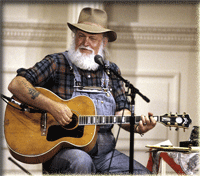 |
Jack Vartoogian
FrontRowPhotos |
U. Utah Phillips, Folk Troubadour, Dies at 73,
By JON PARELES, New York TimesMay 27, 2008
Bruce Duncan Phillips, the itinerant folk singer, songwriter, storyteller and social activist who jokingly called himself U. Utah Phillips, “the Golden Voice of the Great Southwest,” died on Friday at his home in Nevada City, Calif. He was 73.
Bruce Duncan Phillips, who called himself U. Utah Phillips, performing at Weill Recital Hall at Carnegie Hall in 1992. The cause was congestive heart failure, his family said in a statement.
An instinctively independent guitar-slinger and self-described anarchist with an affinity for history and a trove of one-liners, Mr. Phillips was a regular on the folk circuit from 1969 into the 21st century. “It is better to be likable than to be talented,“ he often said.
His sets were monologues that interspersed anecdotes, political jabs and wry observations with songs — some traditional, some from the labor movement and some he had written, like “Green Rolling Hills,” “All Used Up,” “The Telling Takes Me Home,” “Goodnight Loving Trail” and “Rocksalt and Nails.” His songs were recorded by Emmylou Harris, Tom Waits, Joan Baez, Waylon Jennings and Ani DiFranco, who signed him to her label, Righteous Babe, and produced two albums for him in the 1990s. Mr. Phillips sang about workers, historical events, the West and his great love, trains; for a while he lived in a railroad caboose.
At a performance last year, he said: “It’s nice to know there are some things in early 21st-century post-industrial culture that don’t change very fast. I am one of those.”
Mr. Phillips was born in 1935 in Cleveland, the son of labor organizers who moved to Utah in 1947. He was an Army private in the Korean War. In an interview with Works in Progress, a newspaper in Olympia, Wash., he said about the war’s aftermath: “I was very angry and frightened by what I’d seen and what I had done there. I got on the freight trains, and I rode for quite a while to try to sort myself out. I think I was drunk most of the time.“
He returned to Salt Lake City and ended up at Joe Hill House, a homeless shelter run by a Catholic anarchist, Ammon Hennacy, who shaped Mr. Phillips’s lifelong perspective. Mr. Phillips joined the Industrial Workers of the World, also known as the Wobblies, the internationalist union. Mr. Phillips wrote songs influenced by Woody Guthrie and Pete Seeger and country singers like T. Texas Tyler (after which he modeled his U. Utah Phillips name). He worked at Joe Hill House and then for the State of Utah as an archivist. But after he ran for the United States Senate in 1968 on the independent Peace and Freedom ticket, he lost his state job and decided to try to make a living as a performer.
Encouraged by the singer Rosalie Sorrels, he moved to Saratoga Springs, N.Y., and found his way onto the circuit of coffeehouses, clubs and festivals that would sustain him for the next 38 years — “learning how to make a living, not a killing,” he said in a 2007 podcast. “I discovered a dignified, ancient, elegant trade, one where I could own what I do and never have to have a boss again.”
He recorded his first albums for the Philo label and later recorded for Red House, including an album of duets, “The Long Memory,” with Ms. Sorrels in 1996. He was a straightforward folk singer throughout his career. But for “The Past Didn’t Go Anywhere” (Righteous Babe), Ms. DiFranco winnowed down a hundred hours of concert tapes and melded his songs and stories with electronic tracks influenced by hip-hop. “Fellow Workers,” a 1999 album with Ms. DiFranco and her band, was nominated for the Grammy Award for best contemporary folk album.
In the late 1980s, Mr. Phillips settled in Nevada City with his fourth wife, Joanna Robinson, who survives him along with his sons Duncan, of Salt Lake City, and Brendan, of Olympia, Wash.; his daughter, Morrigan Belle of Washington, D.C.; his stepsons Nicholas Tomb of Monterey, Calif., and Ian Durfee of Davis, Calif.; his brothers David, of Fairfield, Calif., Ed, of Cleveland, and Stuart Cohen, of Los Angeles; his sister, Deborah Cohen, of Lisbon, Portugal; and a grandchild, Brendan.
He started a series, “Loafer’s Glory,” on the Nevada City public radio station, KVMR-FM, which was syndicated nationally and collected on CDs on his own label, No Guff. In 2005 he opened Hospitality House, a nonprofit group that aids the homeless in collaboration with churches, in nearby Grass Valley, Calif. He learned he had heart disease in 2004, and health problems forced him to retire from touring in 2007.
“I don’t need fame and I don’t need power and I don’t need wealth,” he said last year. “I’m in need of friends, which I have found in abundance.”

